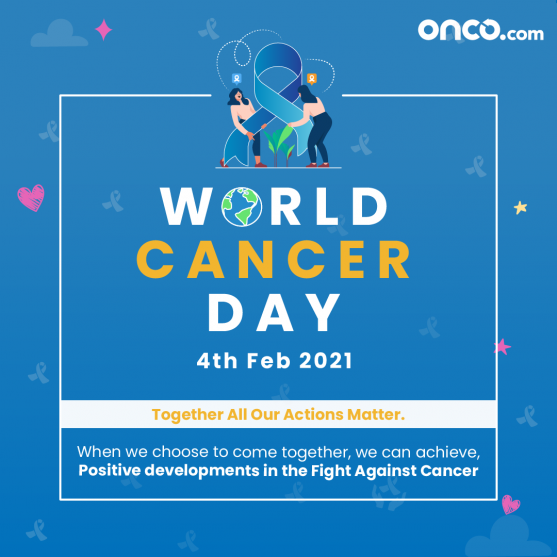4th of February, every year, is commemorated as World Cancer Day. On this day, different governmental and non-governmental organisations from around the world unite to create awareness about cancer.
Who organises World Cancer Day?
The Union of International Cancer Control (UICC) hosts World Cancer Day. Several NGOs, educational and welfare institutions join hands with it by hosting affiliated events and campaigns around the world. Some of these campaigns start months ahead and the planning for it goes on all year round.
Several health and human welfare departments of Governments of different countries also extend their support by participating in these campaigns.
UICC supports the World Cancer Declaration (2008), and plans campaigns and events to accomplish the goals mentioned in that declaration.

What is the theme of World Cancer Day?
For the last four years, since 2018, the theme has been “I AM _____ and I WILL ______”.
This theme asks each person to take a pledge on what they can do to reduce the burden of cancer. Depending on who you are (a doctor, a teacher, a nurse, a cancer survivor etc), you can contribute to the cause of cancer by doing something within your power (like volunteering, talking about cancer, screening for cancer, quitting tobacco etc.).
The theme tells us that no matter who we are, we can make a positive contribution towards reducing the incidence of cancer, and the loss of lives due to cancer. Thus, it makes us aware of the power we hold, and encourages us to use it.
2021 is the final year of this theme.
What’s the purpose of World Cancer Day?
The primary purpose of celebrating this day is to reduce the number of cancer patients and reduce the death rate due to cancer.
According to the World Health Organisation (WHO) cancer is the second largest cause of deaths the world over and about 9.6 million deaths are caused due to cancer every year.
In India as well, it is estimated that 1 in every 9 people will develop cancer at some point in their lives.
This makes cancer one of the heaviest burdens on our healthcare systems and economies.
This burden can be reduced to a good extent through awareness of the risk factors and early symptoms of cancer. Educating the public on healthier lifestyle choices, screening, and early detection, can enable better treatment and recovery rates.
UICC believes that governments should be held responsible for providing better healthcare facilities for cancer patients though policies, legislations, investments and innovations.
For this reason, World Cancer Day is celebrated to create a public response towards cancer care and policy making.
How can I participate in World Cancer Day?
You can participate by speaking up about cancer. Cancer is a taboo topic in many cultures even today. People don’t like to talk about it and this causes many misconceptions about cancer.
Break the silence by talking about cancer. You can take the “I am and I will” pledge. Upload a video of your pledge on social media so that others feel encouraged to also speak freely about cancer.
Tag us on Facebook or Instagram and we will share your video with many more.
You will also find many events, both local and global events, happening online today. You can check out World Cancer Day’s official page for this information. Participate in any of these events and invite your friends and family to join you.
There are many ways to spread cancer awareness at your workplace or school. You can find some ideas here.
Reach out to any cancer survivors, patients or caregivers in your social circle. Let them know that you are doing your bit to help in the fight against cancer.
I want to know more about cancer
Here are answers to a few basic FAQs on cancer. This will help you understand cancer and also explain it to anyone else who is interested.
Q. What is cancer?
When body cells begin to divide faster than normal cells, and begin spreading to surrounding tissues, it is called cancer.
Q. Is cancer preventable?
Although the exact cause for any cancer might be difficult to pinpoint, there are some known environmental and lifestyle factors that increase our risk of developing cancers.
Smoking is the most preventable cause of cancer. In India, 50% of all cancers among men are linked to smoking.
Other factors that increase our risk of cancer include obesity, alcohol, lack of exercise, air pollution, poor diet and unsafe sex.
Only a small percentage of cancers are genetic.
Here are some things you can do to cut down your risk of developing cancer:
- Quit smoking.
- Consume a diet rich in fresh fruits and vegetables.
- Avoid alcohol.
- Maintain an active lifestyle.
- Monitor your weight and avoid obesity.
- Avoid processed foods and red meat.
- Avoid carcinogenic (cancer causing) substances like asbestos and radon in your environment.
- Drink adequate amounts of water.
Q. Why is it important to detect cancer early?
Early detection is important because when cancer is found early, it may be easier to treat and we have higher chances of a cure.
Most cancers are already in advanced stages when they are diagnosed.
If these cancers can be detected at an early stage, it could be possible to treat them completely or prevent their further spread.
Going for regular medical checks and cancer screening can help you detect cancer in the early stages.
Women can conduct monthly breast self-examinations at home to detect any signs of breast cancer at the earliest.

Q. What is cancer screening?
Screening refers to testing individuals who have no symptoms for a particular disease.
Early detection of cancer through screening reduces mortality from cancers of the colon and rectum, breast, cervix, prostate, and lung.
Each type of cancer has its own screening tests and guidelines for who can take these screening tests.
Q. Are there any vaccines to prevent cancer?
Not all cancers can be prevented through vaccination. Vaccines do exist for most types of cervical cancers, and also reduce the risk of certain other cancers like liver cancer.
The HPV vaccine can protect against most types of cervical cancer. This vaccine is usually given to girls at the age of 12 or 13 years.
Q. How is cancer treated?
Cancer is a complex disease and there are many methods used to treat it. Treatments like surgery, chemotherapy, radiation therapy are used, usually in a combination, to manage cancer.
The timely and correct treatment of cancer is crucial. Before starting treatment, a complete plan needs to be made in consultation with experts from different disciplines. This is called a tumour board.
It is also important to get a second opinion on your treatment plan to reduce the margin for errors. A second opinion will either confirm that you are on the right path or it will inform you that certain changes need to be made to improve your treatment plan.
Finding the right oncologist for your treatment is also extremely important. Oncologists specialise in different types of cancer and in different treatment methods. You will need to find the right one for your type and stage of cancer.
You can find all the information you need on cancer and its treatment on our blog pages. Reach out to us on community@onco.com if you have any specific queries on cancer care.

